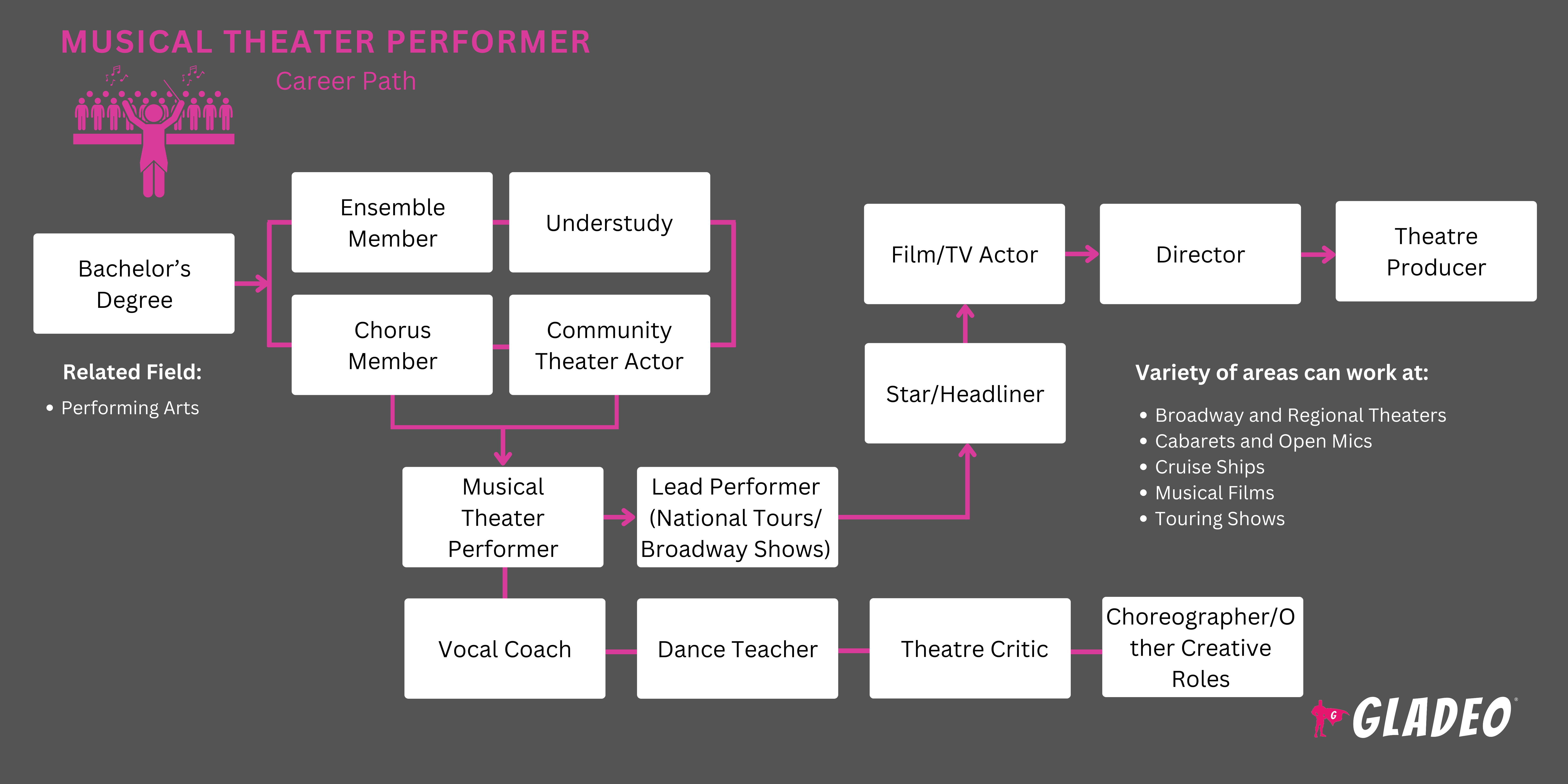Focos
Actor, actriz, comediante, cómico, actor de teatro comunitario, miembro de un grupo teatral, narrador, intérprete, actor de gira, locutor, artista escénico.
Cuando se levanta el telón, los intérpretes de teatro musical dan vida a las historias mediante una poderosa combinación de actuación, canto y baile. Ya sea en un espectáculo clásico de Broadway o en una producción totalmente nueva, estos intérpretes cautivan al público con su talento, energía y emoción.
Su trabajo va mucho más allá de los focos: asisten a audiciones, ensayan durante semanas y colaboran con directores, coreógrafos y otros artistas para crear producciones perfectas. Cada actuación es el resultado de horas de entrenamiento, disciplina y pasión.
¡Esta es una carrera para personas que aman las actuaciones en directo, se crecen bajo presión y quieren expresarse artísticamente!
- Actuar en directo ante un público entusiasta.
- Dar vida a los personajes y las historias a través del canto, el baile y la actuación.
- Viajar o actuar en teatros emblemáticos de todo el mundo.
- Creando amistades para toda la vida y colaboraciones artísticas.
- Ver cómo tu esfuerzo se ve recompensado con aplausos y ovaciones de pie.
Horario de trabajo
- Los intérpretes de teatro musical suelen trabajar por las tardes, los fines de semana y los días festivos. Los ensayos pueden durar entre 6 y 8 horas al día, y las representaciones pueden prolongarse durante semanas o meses. Las giras implican viajar y actuar con frecuencia en nuevas ciudades.
Funciones típicas
- Asiste a las audiciones y a las segundas audiciones para nuevas producciones.
- Ensaya las líneas, las canciones, la coreografía y la distribución espacial.
- Actuar ante público en directo varias veces a la semana.
- Trabajar en estrecha colaboración con directores, coreógrafos y directores de escena.
- Mantén la salud física y vocal para rendir de manera constante.
Responsabilidades adicionales
- Graba vídeos promocionales o entrevistas con fines de marketing.
- Participa en actividades de divulgación comunitaria o talleres educativos.
- Ser suplente en otros papeles de la producción.
- Mantente al día sobre nuevas convocatorias de casting y tendencias del sector.
- Realiza cursos adicionales de canto, baile o interpretación entre espectáculo y espectáculo.
El día de un artista suele comenzar con un entrenamiento ligero, ejercicios de calentamiento vocal y revisión del guion. Los ensayos pueden comenzar a media mañana e incluir canto, práctica de coreografías o trabajo en escenas difíciles.
Las tardes se dedican a descansar, preparar el vestuario y peinarse y maquillarse antes de las representaciones nocturnas. Una vez cae el telón, los artistas se relajan física y vocalmente para prepararse para la siguiente función.
Aunque el calendario puede ser exigente, la energía del público en directo y el vínculo con los demás miembros del reparto lo hacen profundamente gratificante.
Habilidades sociales
- Comunicación
- Presencia escénica
- Colaboración y trabajo en equipo
- Adaptabilidad
- Expresión emocional
- Gestión del tiempo
- Creatividad
- Disciplina y resistencia
Habilidades técnicas
- Técnicas de actuación
- Interpretación vocal y control
- Estilos de danza del teatro musical (jazz, claqué, ballet, contemporáneo)
- Bloqueo escénico y memorización de la coreografía
- Uso del micrófono y del equipo de sonido
- Lectura del guion y la música
- Improvisación
- Protagonistas principales: Protagonizan los papeles principales con canciones en solitario y arcos dramáticos.
- Miembros del conjunto: Actúan en números grupales y apoyan la historia.
- Suplentes y sustitutos: Asumir papeles principales o secundarios cuando sea necesario.
- Artistas itinerantes: Viajan con producciones nacionales o internacionales.
- Artistas de parques temáticos o cruceros: Trabajan en lugares dedicados al entretenimiento.
- Producciones de Broadway y Off-Broadway
- Teatros regionales
- Compañías teatrales itinerantes
- Líneas de cruceros y parques temáticos
- Teatros comunitarios y programas educativos
- Proyectos musicales para televisión y cine
Actuar puede significar largas jornadas, noches de trabajo hasta tarde y un cuidado físico y vocal muy estricto. El rechazo es habitual y las audiciones pueden ser muy competitivas. Muchos artistas tienen varios trabajos o trabajan por cuenta propia mientras desarrollan su carrera.
Sin embargo, la emoción de actuar en directo, la euforia de los aplausos y la oportunidad de hacer lo que te gusta hacen que el viaje merezca la pena.
El teatro musical sigue evolucionando con nuevas historias, repartos diversos y plataformas digitales para mostrar el talento. Las audiciones grabadas por los propios candidatos y las convocatorias de casting online se han convertido en algo habitual. Se espera que los intérpretes sean más versátiles que nunca, combinando a menudo habilidades de actuación, canto, baile y multimedia.
A muchos artistas les encantaba cantar en coros, actuar en obras de teatro escolares o bailar en estudios locales. A menudo disfrutaban actuando para sus amigos y familiares, memorizando canciones de musicales y participando en concursos de talentos o clubes de teatro.
Diploma de secundaria o GED (requisito mínimo)
- Las clases de música, teatro y danza son útiles.
- La participación en musicales escolares, coros o teatros locales desarrolla habilidades tempranas.
Licenciatura o formación en conservatorio (preferible)
- Muchos artistas obtienen títulos en teatro musical, artes escénicas, danza o interpretación vocal.
- Los conservatorios y las escuelas de artes escénicas ofrecen formación especializada e intensiva.
Certificaciones o formación adicional:
- Talleres de entrenamiento vocal y actuación.
- Cursos intensivos de danza o clases magistrales.
- Clases de técnica de actuación o improvisación.
- Apúntate a clases de teatro, coro, danza o música.
- Únete a clubes de teatro o haz audiciones para obras y musicales escolares.
- Participa en producciones teatrales comunitarias o juveniles.
- Participa en concursos de talentos, competiciones o festivales.
- Crea un portafolio de actuaciones con fotos, currículums y clips de actuaciones.
- Asiste a programas de artes escénicas durante el verano.
- Sólido plan de estudios de actuación, canto y baile.
- Profesorado con experiencia y trayectoria profesional.
- Acceso a oportunidades de actuación y exhibiciones.
- Prácticas o colaboraciones con teatros locales.
- Servicios de orientación profesional para audiciones y colocación laboral.
- Instalaciones de estudio de nivel profesional.

- Prepara un buen dossier para la audición con tu currículum, una foto de primer plano y una grabación de tu voz o tus habilidades de baile.
- Haz audiciones para teatros comunitarios, producciones regionales o espectáculos de verano.
- Asiste a convocatorias abiertas y talleres de casting.
- Establece contactos con directores, coreógrafos y otros artistas.
- Manténgase abierto a participar en coros o conjuntos para adquirir experiencia.
- Mantén tus habilidades a punto mediante el entrenamiento y la práctica regulares.
- Crea un portafolio en línea o un sitio web personal para mostrar tu talento.
- Entrena continuamente para mejorar tus habilidades vocales, de baile y de actuación.
- Asiste a talleres avanzados y clases magistrales.
- Haz una audición para papeles más desafiantes o destacados.
- Trabaja con un agente de talentos de buena reputación para obtener oportunidades profesionales.
- Actúa en festivales, showcases y eventos del sector.
- Construye una red sólida dentro de la comunidad teatral.
- Considera afiliarte a un sindicato para poder optar a producciones más importantes.
- Explora funciones relacionadas, como la dirección, la coreografía o la enseñanza.
Sitios web
- Entre bastidores
- Cartelera
- Asociación de Actores
- BroadwayWorld
- Redes de casting
- TeatroMania
- Cartelera
Libros
- La vida del actor: una guía de supervivencia, por Jenna Fischer
- Audición, de Michael Shurtleff
- Un actor se prepara, de Constantin Stanislavski.
Si actuar en el escenario no es lo tuyo, o si te gustaría explorar campos relacionados, considera estas alternativas que te permitirán seguir utilizando tus habilidades artísticas y tu experiencia teatral:
- Director de teatro
- Coreógrafo
- Entrenador vocal
- Profesor de teatro
- Administrador artístico
- Asociado de casting
- Artista del evento
- Profesor de baile
Fuente de noticias

Empleos destacados

Cursos y herramientas en línea

Expectativas salariales anuales
Los nuevos trabajadores comienzan con un salario de alrededor de 75 000 dólares. El salario medio es de 138 000 dólares al año. Los trabajadores con mucha experiencia pueden ganar alrededor de 159 000 dólares.
Expectativas salariales anuales
Los nuevos trabajadores comienzan con un salario de alrededor de 62 000 dólares. El salario medio es de 79 000 dólares al año. Los trabajadores con mucha experiencia pueden ganar alrededor de 121 000 dólares.
Expectativas salariales anuales
Los nuevos trabajadores comienzan con un salario de alrededor de 60 000 dólares. El salario medio es de 62 000 dólares al año. Los trabajadores con mucha experiencia pueden ganar alrededor de 136 000 dólares.






